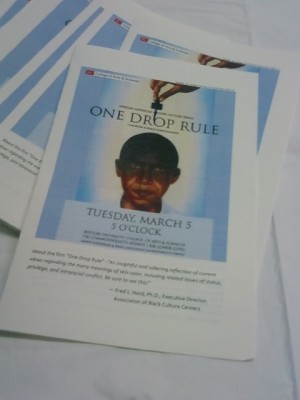
On Tuesday, an event titled “One Drop Rule: Colorism and Black Consciousness” attracted over 35 people to the basement of The College of Arts and Sciences. A film screening and subsequent discussion opened a dialogue about discrimination within the black community and how skin tone affects perceptions about a person’s worth.
Janjay Innis, a graduate student in the School of Theology, organized the event to continue a previous a dialogue about the concept of the black identity.
“This all stemmed from a conversation that we had about a year ago about blackness and identity and the way it’s manifested in America and in the African diaspora,” she said. “I think we came out of that discussion saying blackness was more of an experience than it really was about how we looked like one another.”
According to Professor Ruha Benjamin, an assistant professor in the African American Studies and Sociology programs at BU, colorism is a form of dividing people based on skin tone and assigning value to those different skin tones. She emphasized that colorism is an outgrowth of racism, but that it often occurs within racial and ethnic groups and causes conflict within these communities.
“It’s not just simply about seeing differences, but it’s about thinking that those differences mean something and specifically that the lighter that you are within a racial group that the better that you are,” she said. “Every kind of trait that our society has deemed as valuable is assigned to those who are lighter.”
Innis said she wanted to include voices from across the African diaspora, so she chose a set of panelists with diverse fields of study and backgrounds.
The panel consisted of six members: Professor Benjamin, who moderated; Nuri Chandler-Smith, an activist and Professor of African American Studies at Northeastern University; R. Joshua Reynolds, a graduate student at BU’s Metropolitan College; Naeemah Kitchens, a graduate student in the African American Studies program; Shani Ogilive, an junior in Sargent; and Derrick Muwina, a graduate student in the School of Theology.
Before the panel discussion began, the audience viewed a 2001 film called One Drop Rule, a 45-minute documentary put out by California Newsreel. The film takes its name from legislation in the 1930s that said anyone with one drop of African blood could be considered black. In the film, a variety of people who could identify as black according to the one drop rule discussed their experiences and perceptions surrounding the broad spectrum of skin tones within the black community.
There were a variety of ideas about the black identity and experience expressed in the film. It was clear through subject testimony that there was a divide between darker and lighter skinned blacks. One man described the “paper bag test” where people would compare their skin tone against a paper bag to see who was lighter and who was darker. Those lighter than the paper bag “passed” and those darker “failed,” though it wasn’t entirely clear what they were testing for in the first place.
After the film the panelists discussed their thoughts on the topics raised. Ogilive, who identified herself as Jamaican-American, said she didn’t see discrimination based on skin tone in her home life or the Jamaican community. She also said she had a problem with the term colorism. In contrast, Reynolds told a story where he and his friends sent their lightest skinned “brother” out to hail a cab, thinking he would have the best luck. (Apparently he didn’t have very good luck anyway–it took them over an hour to get a cab.)
Audience member Lyse Barronville (CAS ’14) said she attended the event because the subject matter was really important to her. She said within her own family she sees discrimination based on skin tone, as her father’s side of the family has darker skin tones than her mother’s.
“Seeing this video kind of makes me cringe,” she said, commenting on her disappointment with the prejudices shown in the film.
Professor Benjamin said she believes conversations like this show opportunities for understanding and progress.
“What it represents and why it’s so important is that it represents a maturity in the discourse of how we want to achieve racial justice and achieve racial harmony,” she said. “It’s talking about the problems and the frictions and the antagonisms within a particular community.”
“One Drop Rule: Colorism and Black Consciousness” is part of a lecture series put on by the African American Studies program in the Graduate College of Arts and Sciences. For more information on the series visit their events page. One Drop Rule is a film put out by California Newsreel, a non-profit, social issue documentary film center. For more information on Newsreel and its films, visit newsreel.org.


One Comment on ““One Drop Rule” Discusses Colorism in the Black Community”